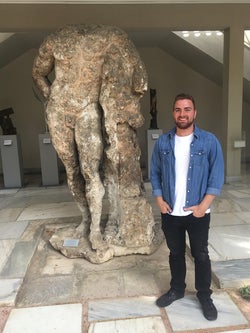Matt Coleman
MA graduate | Classical Studies
Matt Coleman is a recent graduate of the Classical Studies MA, and while he has now moved on to continue his academic path at the University of Toronto where he is enrolled in the Classical Studies PhD, he cites his graduate experiences at Waterloo as vital in strengthening his academic pursuits.
In a field like classical studies which is interconnected to many other fields of academia, students need to be empowered to work in an interdisciplinary way and consult experts when they need guidance. Matt says, “My MA project focussed on art history, but through it I practiced classical philology, semiotics, genealogical studies, archival studies, archaeology, and a number of other fields. Graduate study is the level at which you are meant to make great leaps in your research ability and that begins with interacting at a meaningful, substantial level with your peers and with faculty all over the university.”
When Matt was a master’s student, his research focused on the reasons for collecting antiquities and the role of sculpture display during the Italian Renaissance. This time period is especially relevant as it set the groundwork for the collective modern interest in antique material, ancient sculpture, painting, literature, archaeology, and continues to affect modern application. He says, “My research takes aim at popular usages; uses of the ancient that everyone can feel a part of. Sometimes this means challenging some of the traditional views of the field but so often that type of work can be the most fun and feel the most productive.” Now that he is pursuing his PhD at the University of Toronto, he aims to use his research to resurrect ancient materials outside of their traditional and niche spaces to make them more accessible to modern life and society.
In the Classical Studies department, students are supported at every turn and encouraged to pursue their diverse research interests abroad. He says, “The travel opportunity is unparalleled here. Within the department and extending into the university at large it is clear that they want to send you to wherever you need to go to conduct the most meaningful and holistic research you can and that was communicated to me at every level.” The size of the community and the level of support students receive make it an appealing place to pursue graduate studies, says Matt. “The department truly does put student experience, student need, and student interest first and the faculty and staff go above and beyond to make sure you get where you want to go.”

The genuine support from all levels in my department was incredibly important to me and allowed my research to remain on schedule, to finish strong, and allowed me to say in the end that I had presented a genuinely substantial contribution to the field.
With a deep desire to eventually become a professor of classical studies in a classics or art history department, Matt hopes to continue to challenge the ways Classical material is researched and interpreted. He says, “I want to continue to highlight more popular, accessible aspects of the ancient world, and to continue to learn about student interests, to promote new avenues for young researchers, and to encourage a younger generation, than even myself, to continue pushing the traditional parameters of classical studies into more and more modern spaces.”